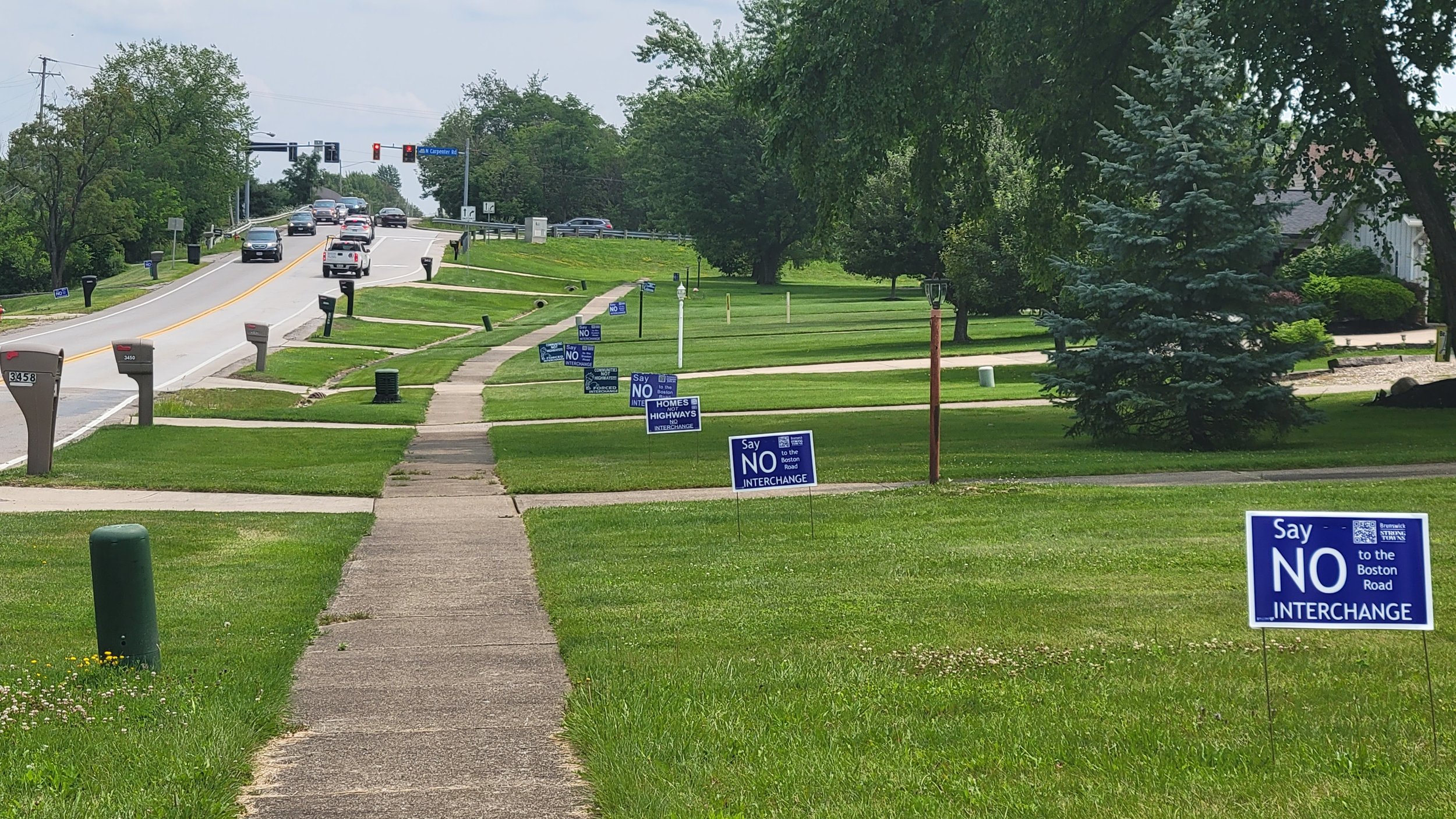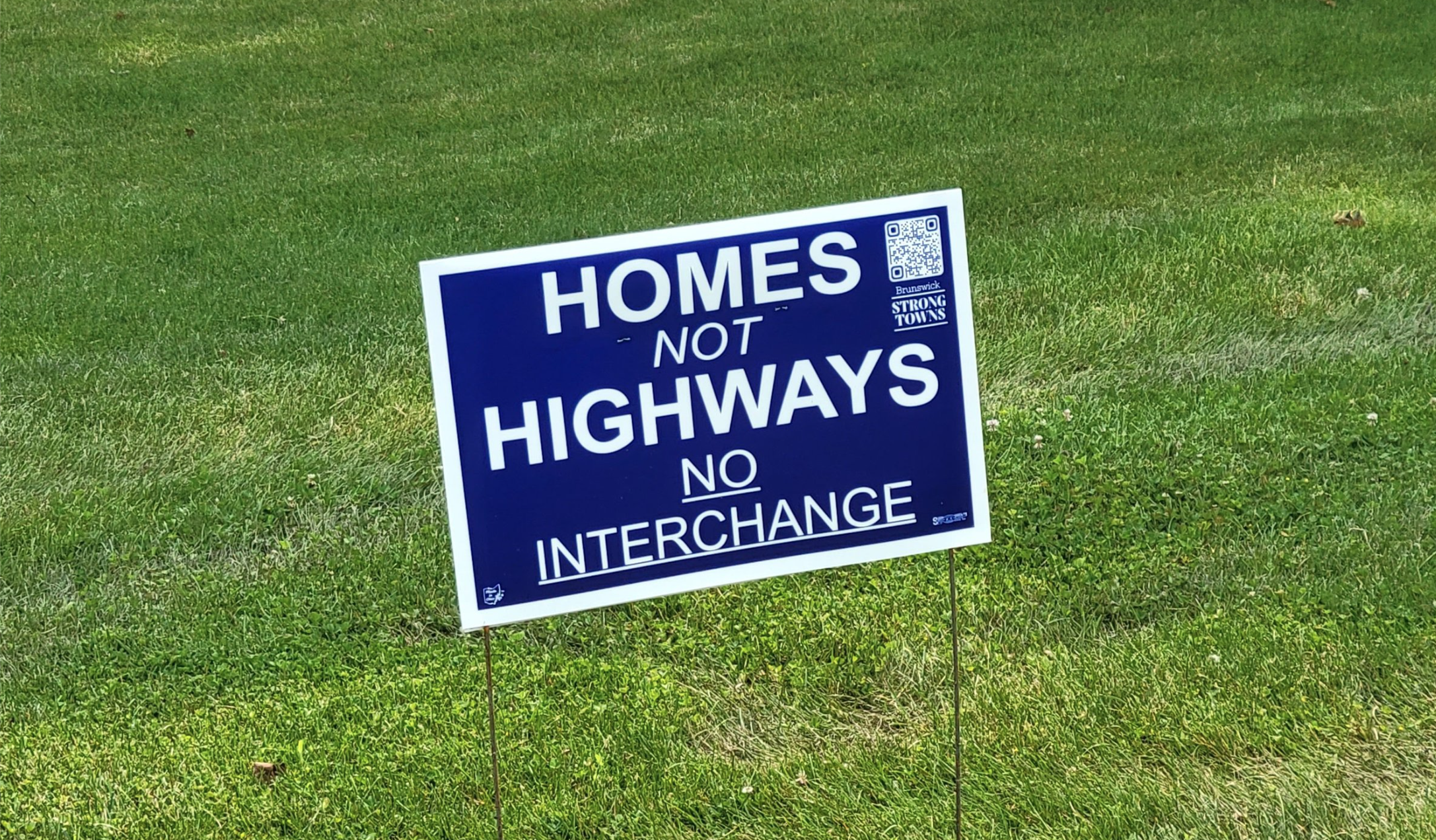Editor's note: A version of this article originally appeared on Strong Towns. It is republished with permission.
In March 2023, hours before the Ohio state governor signed the new House Bill 23, State Representative Tom Patton wrote new language in the transportation budget that mandates the Ohio Department of Transportation build an interchange every 4.5 miles between major cities. Residents of Brunswick, Ohio, are alleging that this unprecedented act was done because of one hotly debated junction between Brunswick and the neighboring city of Strongsville.
“At its most basic level, my city was blindsided,” said Justin Boey, an avid local advocate in Brunswick.
For decades, Strongsville has pushed for an interchange at Interstate 71 and Brunswick's Boston Road, while Brunswick pushed back in an effort to preserve its growing neighborhood. The Northeast Ohio Areawide Coordinating Agency and the Department of Transportation have denied Strongsville's request for the interchange, but this year, Patton overrode the system, ignored local desires, and dictated the interchange be completed through the law.
Now, even though the city of Brunswick has openly opposed the project for decades, they are forced to transfer funds planned for walkability projects into preparing for and maintaining this unwanted interchange.
“What this is saying is if somebody really wants to run a highway through your neighborhood, they can do it,” said Brunswick City Council President and Vice Mayor Nick Hanek. “There's a law on the books now, and that law mandates something has to happen.”
The targeted neighborhood homes primarily belong to retired persons, young families, or others on a fixed income. Shrea Kellum, one such resident, who’s been at risk of losing her home of over 30 years over this debate, said finding out about the impending interchange was like a “punch to the gut.”
“It was done wrong,” said Kellum. “It was done unfairly and, to me, dishonestly.”
With traffic congestion filling up State Route 82 during rush hour, Patton told News5 the interchange would be a “poster child for traffic safety” and relieve traffic congestion. By contrast, some Brunswick residents suspect drivers will be saved only three to five minutes on their commute, and at the cost of tearing down local homes.

“I have been here 42 years,” said Sue Mazzola, another local who’s at risk of losing her and her husband’s home. “I have three grown daughters, and I have brought every one of my babies home to this house from the hospital. So this house holds a lot of memories. This is more than monetary value: it's my memories of raising my children. I am now a grandmother of five and my grandchildren are here a lot. This is, in a sense, their home, as well.”
No final plan for the impending interchange has been made publicly available. Residents along Boston Road have been unable to get answers from the city of Strongsville on whether they will need to relocate or not. While a preliminary study commissioned by Strongsville estimates up to 14 households will be demolished, locals suspect that number will increase.
“We are in limbo,” said Mazzola. “My husband was thinking of retiring at some point soon. We got a new roof, new siding, and new windows. We did all our upgrades so that all those big expenses were out of the way—so that when he retired, we wouldn't have [to worry about] those. We are not in a position to start over.”

The Brunswick city council unanimously spoke against Strongsville’s push for the interchange and denounced the project. The council warns that connecting I-71 with Boston Road would change a neighborhood with a country feel into a commercial corridor, lower nearby property values, destroy people’s homes, and ultimately risk bankrupting the city of Brunswick. And, even according to Strongsville’s own study, the interchange wouldn’t solve their problem of traffic congestion along Route 82.
“It's just fiscally irresponsible,” said Hanek. “This would bankrupt the city for all intents and purposes and [destroy our] long-term economic development.”
Even if the state pays for the construction of the interchange, Brunswick would still be forced to contribute millions to the project.
A jet fuel pipeline and a gas pipeline runs along Boston Road. Both would likely need to be moved to construct the two-lane road into four lanes for the interchange. A few years ago, it was estimated the move could cost Brunswick a minimum of $5.5 million. But with prices having increased over the past few years, and projects tending to cost more than initially perceived, Hanek suspects it could be a lot more.
“We’re talking near $100 million,” said Hanek. “That's more than our budget for the year. And we're mandated to do it.”
The new interchange would also devalue the neighborhood, affecting the city's finances on a long-term spectrum. Even now, home values have already lowered with the threat of an impending interchange and forever-altered landscape. With a capped tax system, other homes throughout Brunswick are expected to see an increase in their tax bills—burdening other residents with higher property taxes to make up for the fallen values. “The tax burden will go up,” said Hanek. “People will move out and it's going to just perpetuate the issue.”
Once the interchange is built, even if paid for by the state, Brunswick will perpetually be responsible for spending millions in maintaining the new four-lane highway and interchange. “All of this would take all the investments that we can make toward our vision [for more walkable infrastructure] and push them back years, possibly even decades,” said Boey.
In 2020, Brunswick adopted a new comprehensive plan. “I don't think you can go more than one or two pages without hearing something about walkability and how that's the future,” said Boey, “but now we will be on the hook for several different things if this [interchange] happens.”
Because the interchange is now a legal matter that Brunswick is forced to implement, they must set aside their original city plans to cater to the new state law.
“One of the most disappointing things is the road where they're looking at putting the interchange, we actually [hoped to use for] bike lanes to connect to a broader park system,” said Hanek.
“We are being forced to take a step back by our neighbor to the north,” Boey said. “The fact that this is being forced upon my community, [that] we've got no say, is just wildly wrong.”
Since the news spread of the law change, locals have been doing everything in their power to fight it. “We've just been fighting and trying to get anyone who can listen to listen,” said Boey. “And anyone who can write about it to write about it.” In efforts to raise awareness of the interchange, Boey and the Brunswick Local Conversation began to create and order yard signs. They started out with small orders, but once the printing began, locals started asking for more. Now, there are hundreds of signs throughout Brunswick saying “Homes Not Highways / No Interchange” and “Say No To The Boston Road Interchange.”
The people of Ohio, from any city, can help the locals of Brunswick save their town by signing a letter of opposition. Already, there are over 1,000 signatures.
“The more signatures we can get from this, the more [the Department of Transportation] will look and try to stop the interchange,” said Boey.






